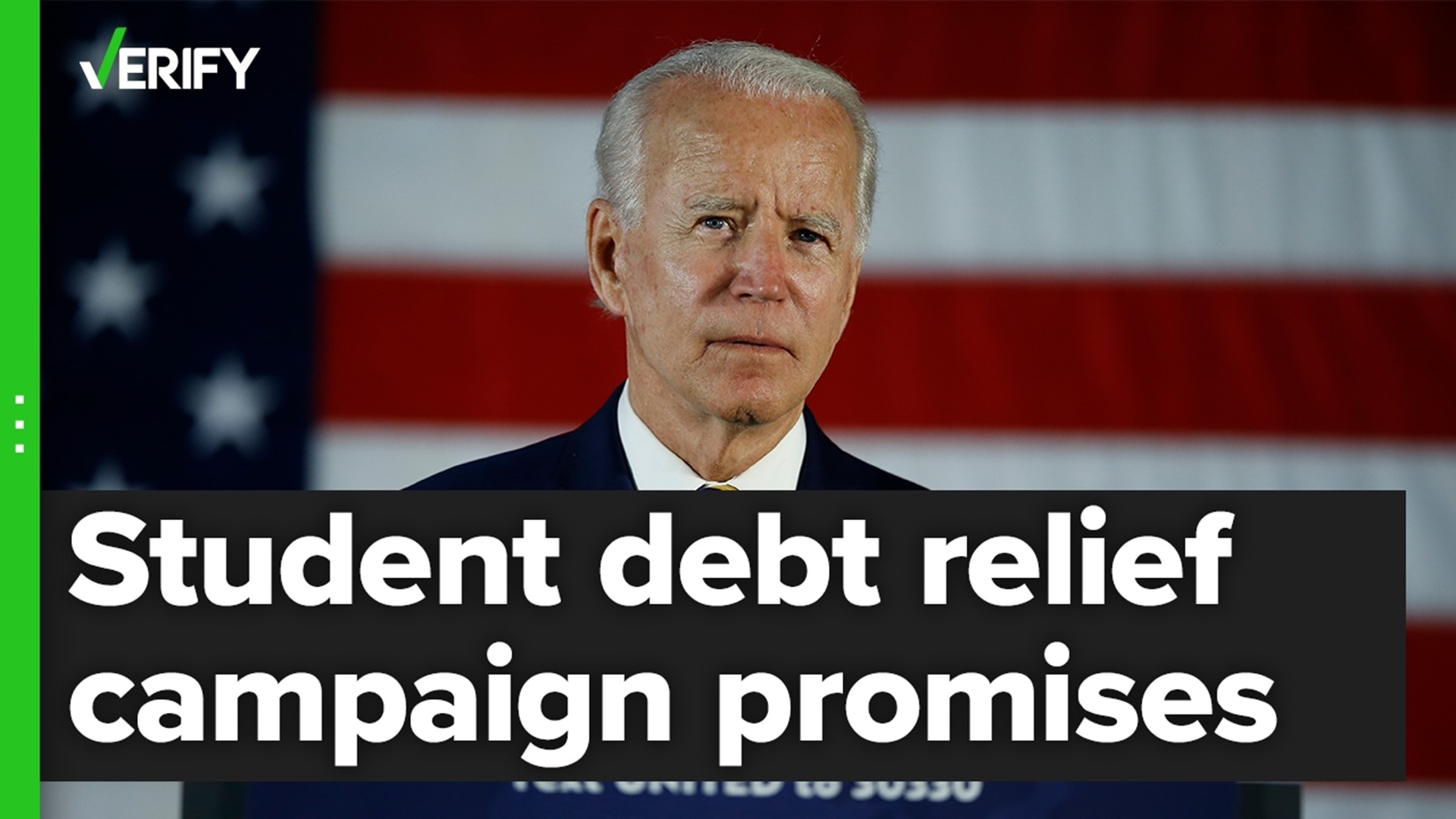UPDATE (6/30/23): The Supreme Court has struck down the Biden administration's one-time student loan forgiveness plan. Loan repayments are expected to resume later this summer. You can read more information here.
UPDATE: President Joe Biden announced on Aug. 24 that his administration will forgive $10,000 in student loan debt for those who didn’t receive Pell Grants, and $20,000 for those who went to college on Pell grants. Debt forgiveness applies to those earning less than $125,000. Biden also extended the pause on student loan payments through Dec. 31, 2022. The original story continues as written below:
As President Joe Biden reportedly considers forgiving some student loan debt, some activists are claiming the proposals currently on the table don’t measure up to the promises he made on the campaign trail.
Biden did not reveal details of what is currently under consideration, but did rule out some possibilities, including a universal cancellation of $50,000 of student debt per borrower, an idea promoted by many progressives.
One viral tweet argued Biden got elected on promises to go even further than that, saying, “A reminder that Biden ran on canceling *all* your federal student debt if you went to an HBCU [Historically Black College or University] or public college and make under $125k. That was the campaign trail.”
Some replies to the tweet were surprised by the claim, suggesting it sounded more like rhetoric from further-left candidates like Sen. Bernie Sanders.
THE QUESTION
Did Joe Biden propose forgiving all federal student debt for borrowers who attended public colleges or HBCUs and have yearly incomes below $125,000, while campaigning for president?
THE SOURCES
- Medium post from then-candidate Biden
- Policy recommendations from Biden-Sanders Unity Task Force
- Official Democratic Party Platform
- Biden remarks during a town hall
THE ANSWER
Yes, Joe Biden proposed forgiving all federal student debt for borrowers who attended public colleges or HBCUs and have yearly incomes below $125,000, while campaigning for president.
WHAT WE FOUND
On April 9, 2020, then-candidate Biden wrote a post on Medium detailing his proposals to assist people struggling economically during the pandemic and its associated recession.
In the post, he wrote, “Under this plan, I propose to forgive all undergraduate tuition-related federal student debt from two- and four-year public colleges and universities for debt-holders earning up to $125,000, with appropriate phase-outs to avoid a cliff. The federal government would pay the monthly payment in lieu of the borrower until the forgivable portion of the loan was paid off. This benefit would also apply to individuals holding federal student loans for tuition from private [Historically Black Colleges and Universities] and [Minority-Serving Institutions].”
While the specifics of this proposal were not repeated in speeches and the press as often as some of his other plans, it did come up again.
In July 2020, a team of policy experts selected by Biden and Bernie Sanders assembled as the “Biden-Sanders Unity Task Force” to create a proposed agenda for a potential Biden administration, one that would appeal to both moderate and progressive members of the party.
Among the recommendations in that document, which is still accessible on Biden’s campaign website, was the proposal to eliminate debt for public and HBCU borrowers.
Under the header “Higher-Ed Priorities and Proposals” and sub-header “Debt/Loan Cancellation” is language that is nearly identical to Biden’s earlier Medium post: “Forgive all undergraduate tuition-related federal student debt from two- and four-year public colleges and universities for debt-holders earning up to $125,000, with appropriate phase-outs to avoid a cliff. This benefit would also apply to individuals holding federal student loans for tuition from private HBCUs and MSIs.”
Biden himself was not an author of the document, and his campaign only publicly committed to “reviewing” its proposals. However, the same language again was included in the final version of the official Democratic Party Platform approved at the 2020 Democratic National Convention.
“For those earning less than $125,000, we support forgiving all undergraduate tuition-related federal student debt from two- and four-year public colleges and universities, and we will also apply this benefit to individuals holding federal student loans for tuition from private HBCUs and MSIs,” the platform reads.
Finally, at a town hall hosted by NBC in October 2020, just a month before his election, Biden appeared to reference the same plan when discussing the economic obstacles facing young people.
“That’s why I’m going to eliminate a lot of your student debt if you… come from a family [making] less than 125 grand, and you went to a public university,” he said.
Biden has not taken such action as president. He has repeatedly extended a pause on repayment of all federal student loans, which was initially enacted under President Trump, and expanded forgiveness options for some select groups of borrowers, such as those who enter public service or those who were defrauded by for-profit institutions.
The president is reportedly now considering forgiving $10,000 per borrower, with an income cap for eligibility. He is expected to make an announcement sometime in May.

